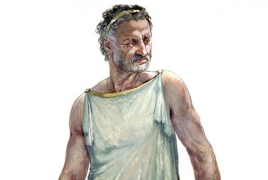
A decades-old mystery about the body of Alexander the Great's father has been solved, anthropologists claim, according to LiveScience.
A new analysis of bones from a Macedonian tomb complex reveals a skeleton with a knee injury so severe that it would have caused a noticeable limp in life. This injury matches some historical records of one sustained by Philip II, whose nascent empire Alexander the Great would expand all the way to India.
The skeleton in question, however, is not the one initially thought to be Philip II's — instead, it comes from the tomb next door. The skeletons are the subject of an entrenched debate among experts on ancient Greece and Macedonia. While some praised the new study, others pushed back, suggesting the new research will not quell 40 years of controversy, LiveScience says.
The story of Philip II is wrought with twists and turns. In 336 B.C., the king was murdered by one of his bodyguards. The motives for the assassination are unclear. Some ancient historians wrote that the murder was an act of revenge stemming from a sordid tale of suicide and sexual assault between Philip II's male lovers and other members of the court.
Whatever the cause, murder was de rigueur for the Macedonian royal family. Within days of Philip II's murder, one of his wives, Olympias — mother of Alexander the Great — let her own homicidal tendencies run free. According to the Latin historian Justin, Olympias killed the newborn daughter of Philip II's newest wife, Cleopatra, in her mother's arms. She then forced Cleopatra to hang herself.
When archaeologists uncovered a Macedonian tomb complex near the Greek city of Vergina in the 1970s, they knew they had royal burials on their hands. But which tombs belonged to which royals
There are three tombs at the site. Tomb I had been plundered in antiquity but contained human remains and an intricate wall painting of the Rape of Persephone. Tomb II was intact. Inside were the cremated bones of a man and a woman, surrounded by armor and other lavish items. Tomb III is widely accepted to belong to Alexander IV, Alexander the Great's son.

